
The name Mamou is recognized around the world as synonymous with Cajun culture. Celebrated
in songs like "Grand Mamou," this small town located in Evangeline Parish about
10 miles north of Eunice attracts visitors from many different countries who come not only
to take part in special events like Mardi Gras but simply to stop by one small bar that
has had a central role in the growing international interest in Cajun culture.
 Governor Foster is shown in the camouflage cap
moving through the crowd in front of Fred's. Governor Foster is shown in the camouflage cap
moving through the crowd in front of Fred's. |
On November 16, 1996, Fred's Lounge in Mamou
celebrated its 50th anniversary with the unveiling of a plaque by Louisiana Governor Mike
Foster in a ceremony in which all of the town's officials participated. The plaque's
inscription reads, "In memory of Alfred 'Fred' Tate, 11/20/12-7/15/92. November 20,
1946: Fred purchased Tate's Bar, now known as Famous Fred's Lounge, Mamou, LA. In 1950
Courir de Mardi Gras was revived at Fred's Lounge. June 1962: The late Revon Reed began a
remote radio program at Fred's Lounge which is still alive today (KVPI 1050 AM) radio
station. French Renaissance (Cajun Music, Language and Culture) after World War II
originated at Fred's Lounge." The musicians who performed on that program (in earlier years broadcast on KEUN radio in Eunice) are legendary--groups like the Mamou Cajun Band with Sady Courville, Hilbert Dies, Ambrose Thibodeaux, and Preston Manuel. Today the same music continues with various great Cajun bands like Don Fontenot and Les Amis de la Louisiane and the Dixie Club Ramblers. Whichever Saturday you decide to visit, you are guaranteed to hear great traditional Cajun music. Fred's is open at additional times during Mardi Gras. |

|
Fred's is open only on Saturdays, 8 a.m.to 2 p.m. The music starts about 9 a.m., with the radio broadcast over KVPI in Ville Platte starting at 9:15 and continuing until 11:15. The band finishes by about 1:30 p.m. Although the Tate family sold the establishment in December 1996, Tate's former wife, Sue Vasseur, known as Tante Sue de Mamou, continues as manager. Fred's Lounge may have become a shrine for Cajun culture, but that fact does not at all interfere with the joie de vivre experienced by the patrons. Or, as one visitor commented , "Can you think of another place in the United States or the world where it's 9 in the morning and you can have this much fun?" |
Mamou bills itself as "The Cajun Music Capital of the
World." Mamou musicians, in particular the musicians who have performed at
Fred's, have been a major force in expanding the audience for Cajun music far beyond
Southwest Louisiana.
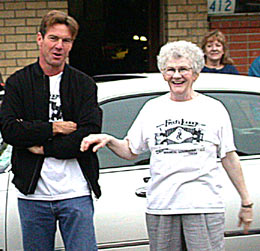 |
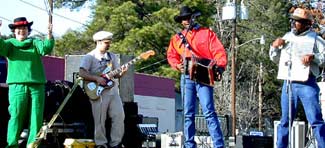 |
| Actor Dennis Quaid, who first visited Mamou while in Louisiana for the filming of The Big Easy, is shown watching the Mamou Cajun Christmas Parade standing next to Tante Sue December 8, 2001. The parade featured live Cajun and Zydeco bands on floats. Shown above from the 2000 parade is Geno Delafose and French Rockin' Boogie. His mother, JoAnn Delafose, is tossing candy to the crowd. Click here for photos of the 2002 parade and the 2003 parade. |
|
Go to the Official
Cajun Music Festival site for schedules and more information
or try
myspace.com/mamoucajunmusicfestival Cajun Music Festival. The festival is held annually. In 2002, for the first time the festival was held inside the air-conditioned multi-purpose skating rink building right next to the old location. The festival includes a variety of Cajun musicians and groups. Visitors can just enjoy the music or join the crowds on the dance floor. There are also contests like egg throwing, boudin eating, a washer board tournament, the Cajun "dizzy dash," watermelon eating (for kids) to add to the fun and festivities. The festival also offers instructional classes in dancing, accordion making, and Cajun music. |
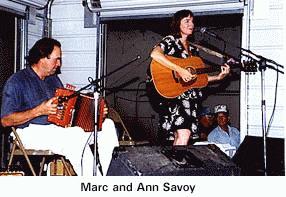
|
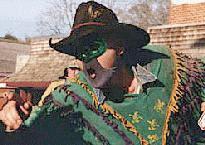 |
Courir de Mardi Gras. Of all of the rural courirs, Mamou's Courir de Mardi Gras has attracted the most attention, perhaps because the organizers have been so insistent on preserving the old traditions and customs. In addition to the courir, there's a big street dance Monday evening. For more information go to the Mamou Mardi Gras page. |
Mamou is not just a great tourist destination. It's also a great place to live. Mamou was awarded first place in the category of Community Development for Louisiana towns its size based on improvements in recreational facilities. The town has added lighting and pressboxes to ballparks and made similar improvements to tennis and volleyball courts and to other facilities.
How did the name Mamou originate? Mamou was founded when C.C. Duson in 1907 developed the town site and began selling lots. In 1911, Mamou was incorporated. The name derives from the Mamou Prairie, where the town is located, but how did the prairie get its name? One version is that Mamou is an Indian name meaning "Big Hunting Ground." After offering several other possible explanations, Revon Reed in his book Lache Pas La Patate gives this fanciful account: When the prairie was first settled by Europeans, they brought their animals, including herds of cattle. Mother cows with their calves were everywhere on the prairie. "Maa," the calves would call out. "Moo," the mother cows would respond.
"Maa." "Moo." "Maa-Moo" et poof! Voilà, la naissance de Mamou. Éclatante, non?
For more information about the origins of Mamou's name, Mardi Gras in Mamou, the history of Evangeline Parish, and a myriad of other interesting facts and opinions, visit the home page of Mamou's legendary Cajun writer and historian, Pascal Fuselier. Pascal Fuselier died in 2002.
For information about activities in Mamou, contact the Town of Mamou, 1-337-468-3272.
Return to Central Acadiana Gateway
Updated March 2009
These pages were established and maintained by
David Simpson, who retired from LSUE in
2009.
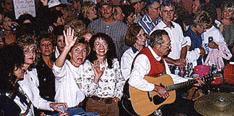
 In 1998, the all-female
Magnolia Sisters were among the groups performing Saturday at the Cajun Music Festival
(pictured are two of the Magnolia Sisters, Ann Savoy and Jane Vidrine).
In 1998, the all-female
Magnolia Sisters were among the groups performing Saturday at the Cajun Music Festival
(pictured are two of the Magnolia Sisters, Ann Savoy and Jane Vidrine).